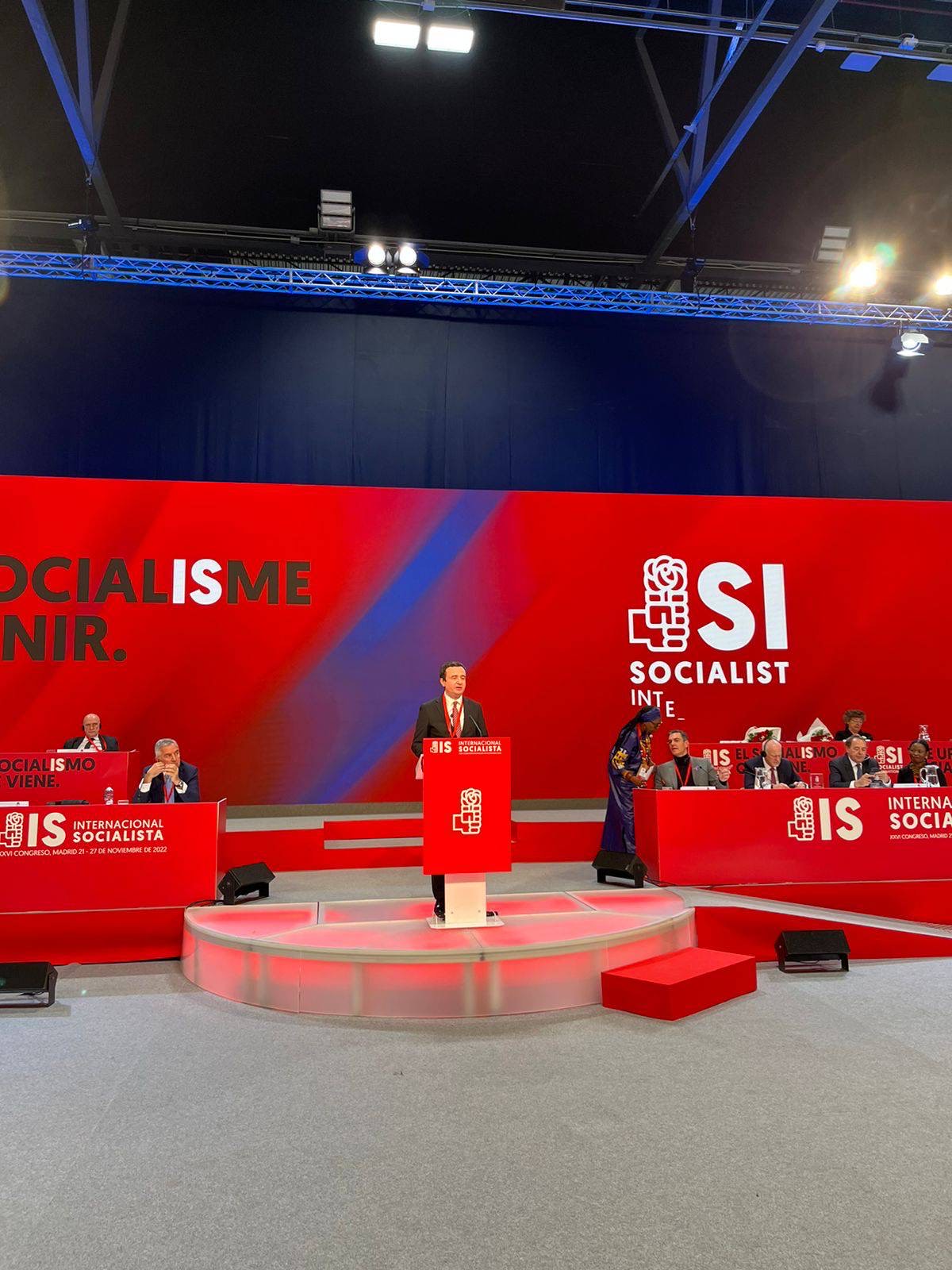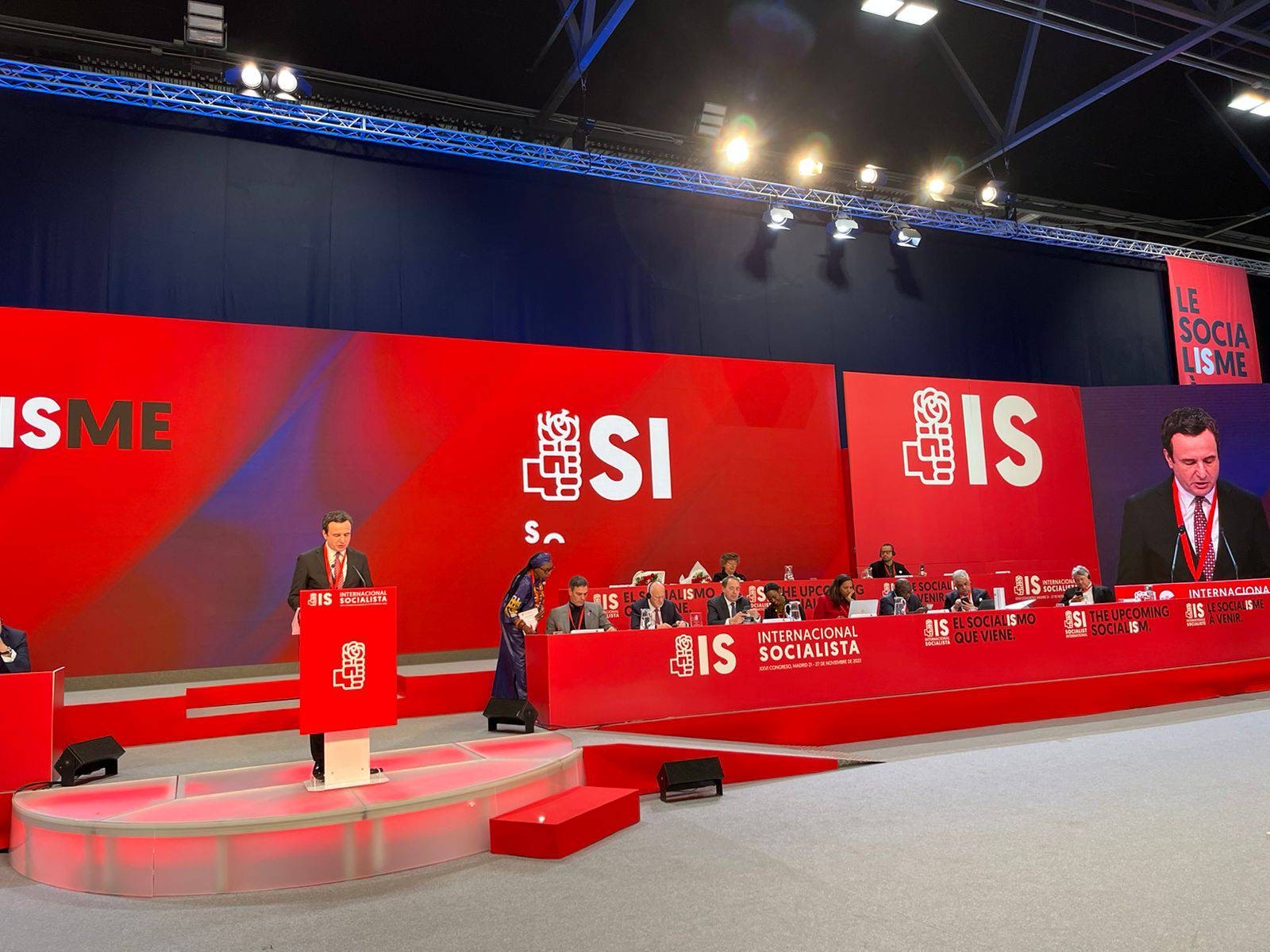Madrid, Spain, 25 November 2022
Prime Minister of the Republic of Kosova, Albin Kurti’s speech at the Socialist International Congress:
Dear new President of the Socialist International, Prime minister of Spain, Mr. Pedro Sánchez,
Dear new Secretary General, Madam Benedicta Lasi,
Dear Mr. Papandreou and Mr. Ayala,
Dear friends and colleagues,
Since Immanuel Kant’s famous proposition on the relationship between the two, peace and democracy have been very closely associated in our imagination. The Kantian thesis, namely, that democratic republics—as opposed to authoritarian ones—tend to be peaceful in their outward behaviour, has come to be known in the international relations literature as the Democratic Peace Theory (DPT). This theory suggests that democratic republics do not fight other democratic republics, though they may engage in war against non-democratic countries. The recommendation for those who love peace is to work toward increasing the number of democratic countries: the greater the number of democratic countries, the more peaceful our world. This implies that the state is not the “black box” of the realist school of International Relations. Quite the contrary, there is a strong link between the domestic institutions of a country and its behaviour in the international arena.
The proposition of the Democratic Peace Theory has been a subject of debate ever since its formulation by political scientists who based it on Kant’s famous essay “Toward Perpetual Peace.” On the one hand, skeptics have pointed out counter-examples to the theory. On the other hand, defenders have responded by interpreting the theory in ways that try to make it compatible with what seems like evidence to the contrary. Be that as it may, I belive Kant’s original conception of the conditions of possibility for genuine peace is quite robust. Unlike the narrower interpretation given by IR theorists, Kant postulated that genuine peace would reign in world affairs only if all of the following three conditions were satisfied: 1) democratic-republican institutions, 2) a peaceful union of states, and 3) an ethos of universal hospitality. In other words, democratic-republican institutions are necessary but not enough. The best real-world approximation we have of this Kantian vision is the European Union. As a union of democratic states dealing with one another in a spirit of hospitality, the European Union has been a guaranteer of peace in Europe for the last 70 years. If this is possible for a continent that gave the world two world wars, why is it naive to hope for its extension to the rest of the world? And closer to home, why should it be unattainable for a first neighbor of the EU such as the region of Western Balkans? It is on this latter question that I want to say a few words today.
The missing ingredient for peace in the region of Western Balkans is a democratic Serbia. Unfortunately, our neighbour to the north, and one with whom the Republic of Kosova shares the longest border, is still an authoritarian country with territorial aspirations toward us, and broad and close links with Kremlin. Ever since the cessation of hositilites in 1999, they have consistently threatened us with belligerent behavior. To this day, they maintain 48 military and gendarmerie installations all around its border with Kosova. Moreover, ever since our declaration of independence in 2008, it has consistently engaged in campaigns seeking to undermine our statehood. Although in 2010 Serbia sought the opinion of the International Court of Justice on the legality of our independence, it has chosen not to respect the court’s findings. More recently, it has been trying to use its influence in the northern part of our country to undermine the rule of law in that region.
Dear friends,
According to Kant, a genuine peace settlement is not possible without nullifying the existing causes of a future war. It is clear, therefore, that what we have had for the last 23 years between our two countries is rather a mere ceasefire than a genuine peace. The obvious question is: how do we move closer to genuine peace?
I believe strengthening democracy in Serbia is the answer. This may seem like a long shot to some, and like a mere truism to others—however, it is the only way we know of creating conditions for long-term peace. With an authoritarian Serbia that refuses to acknowledge war crimes from the recent past, let alone apologize for it, even a modus vivendi is difficult to achieve, let alone genuine peace along Kantian lines. Yet, we engaged in democratic open dialogue in Brussels, facilitated by Europian Union. Because we believe that electoral demoracy is not a form without a function; that opposition has to have real chance of winning, that media should never be silenced by the political party in power, and that behind the shadow of parliamentary democracy there can be no throne-altar alliance that is the real center of power. Yet, we discuss with those who do not share the same believes and who do not have the same reality.
A democratic shift in politics is something that only the people can bring about, but there are ways we can help it from the outside. Solidarity with progresive forces in other countries which are still not democratic, and showing ourselves as example to the world, are the way forward. My government is focusing on developing our economy, reforming our justice system, and strengthening our defensive capacities. In paralel, I remain committed to this EU-facilitated dialogue with Serbia’s current leadership. Dialogue also with those who do not share the same values.
The Republic of Kosova is one of the most democratic countries in our region. Not only can the opposition win elections in our country, but it can even score landslide victories—as we have witnessed on February 14th, 2021. Since our party’s ascension to power, and despite adverse effects from the global pandemic COVID-19, our economy has achieved some notable results. For example, last year we had a double-digit growth of 10.7% of GDP. A significant part of this growth was fueled by people’s greater trust in our government. Over the last year we had a 22 percent increase in foreign direct investment, this year so far is 47 percent, while exports in 2021 increased by 83 percent, and this year by 29%. Without us making any changes to fiscal policy, our tax revenue increased by 34 percent. In addition, there have been also some positive changes to our country’s ranking in reputable international indexes tracking rule of law, press freedom, and government transparency. For example, last year and this year again, World Justice Project ranked us first in the Balkans in its Rule of Law Index. We improved our ranking by 17 places in both, the World Press Freedom Index (issued by Reporters Without Borders) and in Transparency International’s Corruption Perception Index. In other words, our economic progress is going hand in hand with a process of democratic deepening. Today we are all witnessing how economic trobules are leading to democratic backsliding even in parts of the developed West. In these circumstances, Kosova’s recent experience offers a positive example to the contrary and a much-needed glimmer of hope.
Let me conclude by saying that, my dear friends, today, world needs anti-fascists not less than one century ago. Socialist and social-democratic parties should unite different people all over the globe for one common goal: to save the planet of the reoccurrence of the fascists tide.
Thank you very much.




